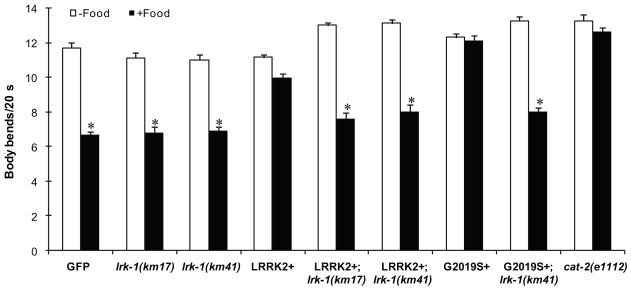Fig. 6.
Loss of endogenous LRK-1 attenuates LRRK2-induced behavioral deficits. Basal slowing response was examined on adult day 4 in transgenic C. elegans lines overexpressing LRRK2 WT and G2019S mutant (LRRK2+ and G2019S+), lrk-1 deletion lines km17 and km41, and their cross progeny [LRRK2+; lrk-1(km17), LRRK2+; lrk-1(km41), and G2019S+; lrk-1(km41)]. Worms carrying lrk-1(km17) and lrk-1(km41) null alleles had good basal slowing response. In contrast, LRRK2+ and G2019S+ worms exhibited prominent loss of basal slowing response as compared to the GFP reporter line. This behavioral impairment was rescued in the cross progeny with the deletion of endogenous LRK-1 as shown by the recovery of basal slowing response in the LRRK2+; lrk-1(km17), LRRK2+; lrk-1(km41), and G2019S+; lrk-1(km41) worms. Age-synchronized worms were grown to adult day 4 on NGM plates. About 10 worms were used for behavioral assay in each strain. The cat-2(e1112) worms defective in dopamine synthesis served as a control. Error bars indicate SEM. *p<0.01 versus no food.

